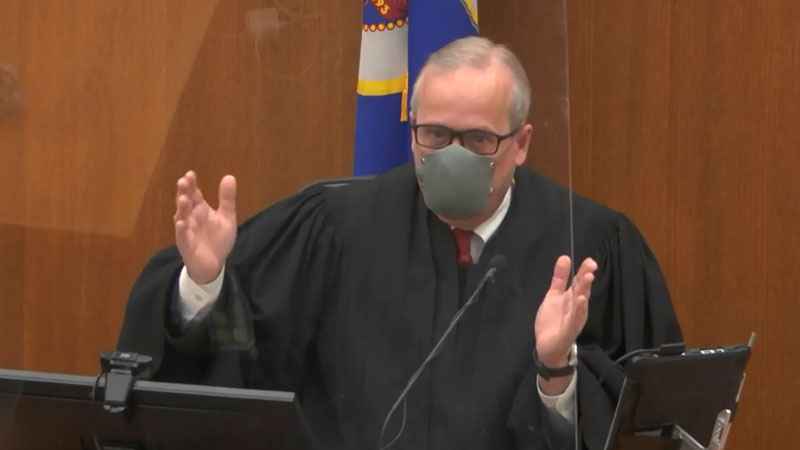Here’s what happened in Day One of the Derek Chauvin trial
[anvplayer video=”5012224″ station=”998122″]
The judge overseeing the trial of a former Minneapolis police officer accused in George Floyd’s death on Monday paused jury selection for at least a day while an appeal proceeds over the possible reinstatement of a third-degree murder charge.
Judge Peter Cahill planned to go ahead with the trial anyway and initially ruled jury selection would begin as scheduled on Monday. However, after prosecutors filed a request with the Court of Appeals to put the case on hold, the judge sent the potential jurors home for the day. With no ruling from the Court of Appeals by around noon, Cahill proceeded with other pretrial motions.
Prosecutors and defense attorneys agreed to dismiss 16 of the first 50 jurors they reviewed "for cause," which Cahill approved. There was no debate over why these jurors were dismissed, so the reasons were unknown, but Cahill said earlier that attorneys would agree to dismiss jurors for cause based on their answers to a lengthy questionnaire. "For cause" dismissals can be for a host of reasons, including when someone expresses views that indicate they can’t be impartial.
The judge said he would proceed with the trial unless the higher courts tell him to stop.
Hennepin County Judge in Chauvin case says jury selection will begin in morning unless State Court of Appeals says otherwise—@KSTP
— Eric Chaloux (@EricChalouxKSTP) March 8, 2021
Minnesota Attorney General Keith Ellison filed a motion with the Minnesota Court of Appeals to keep the trial from proceeding on substantive matters, including jury selection until the district court regains full jurisdiction in the case.

In this image from video, Hennepin County Judge Peter Cahill presides over pretrial motions before jury selection, Monday, March 8, 2021, in the trial of former Minneapolis police officer Derek Chauvin, in the May 25, 2020, death of George Floyd at the Hennepin County Courthouse in Minneapolis, Minn.[Court TV via AP, Pool]
"The State is fully ready to go to trial, but the trial must be conducted in accordance with the rules and the law," Ellison said in a statement. "Now that Mr. Chauvin has stated his intention to appeal Friday’s Court of Appeals ruling to the Minnesota Supreme Court, as is his right, the district court does not have jurisdiction to conduct jury selection or hear and rule on other substantive matters in the trial. We have filed motion with the Court of Appeals to ensure that justice is pursued properly."
During the hearing on Monday, Derek Chauvin’s defense attorneys asked the judge to reconsider his ruling on removing a May 2019 arrest of Floyd, stating the arrest was relevant to the arrest made in May 2020. The defense argues that the two incidents were similar because Floyd didn’t show his hands in both instances, and had a "large amount of drugs in his mouth."
Full coverage of the Derek Chauvin trial
"He was taken into a squad car. He was then ultimately hospitalized, where he had to be physically restrained by hospital staff," the defense stated, in part, about Floyd’s 2019 arrest.
[anvplayer video=”5012190″ station=”998122″]
State prosecutors say the pill fragments found in May 2020 only tested positive for methamphetamine. They also argue Floyd was not restrained the same way he was last year. Cahill allowed the defense to make the argument to include it as supplementary documents but added he "isn’t convinced" of Attorney Eric Nelson’s argument.
In another motion, the defense moved to not use the autopsy conducted by Dr. Michael Baden and Dr. Allecia Wilson, who were hired by Floyd’s family to do an independent autopsy. The defense’s motion asks the court to keep out testimony about medical examinations performed by anyone other than Hennepin County Medical Center’s Dr. Jason Baker.
Hundreds of protesters gathered in downtown Minneapolis as the court sessions were ongoing.
Jury selection is expected to begin Tuesday morning when court reconvenes at 8 a.m., barring any further setbacks.
COURT ADJOURNED: After working through various motions, the court recessed for the day. Jury selection – once again – schedule to start tomorrow at 9 a.m.
— Kirsten Swanson (@KirstenKSTP) March 8, 2021
Judge Cahill’s final words: "Unless the Court of Appeals tells me otherwise, we’re gonna keep moving." @KSTP
The Associated Press contributed to this report.